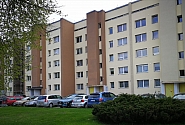
On Thursday, 11 June, the Saeima adopted in the final reading the Law on Real Estate Agent Activities in order to establish a legal basis for the activities of real estate agents and supervise their professional activity. From 1 July 2021, only persons included in the Real Estate Agent Register may provide intermediary real estate services.
“The real estate sector in Latvia currently lacks an effective regulatory framework for the activities of intermediaries. According to sectoral representatives, licensed and reputable service providers constitute only a small part of the market. This Law will finally put the activities of real estate agents into order,” emphasised Ralfs Nemiro, Chair of the Economic, Agricultural, Environmental and Regional Policy Committee, which was responsible for advancing the draft law in the Saeima. He added that every effort should be made to motivate real estate agents to apply for a license instead of engaging in undeclared work.
The Law aims to promote reliable, secure, and trustworthy real estate intermediary services and prevent money laundering and terrorism financing through real estate transactions. The Ministry of Economics will supervise real estate agent activities in cooperation with the State Revenue Service.
The Law defines real estate agent as a natural or legal person who provides intermediary services for real estate transactions, that is, receives remuneration for making real estate transaction offers, negotiating, preparing documents, and providing other services necessary to acquire, lease, or rent real estate or otherwise transfer it for use.
A person wishing to become a real estate agent will have to submit a relevant application to the Ministry of Economics, which will have to maintain a public Real Estate Agent Register on its website. If a real estate agent violates the Law, the Ministry of Economics will have the right to exclude them from the Register.
The Law stipulates that real estate agents must engage in skills development by undergoing further training. The government will decide on the content and minimum amount of further training.
By 31 January each year, real estate agents will have to submit information to the Ministry of Economics on intermediary real estate service contracts concluded in the previous calendar year. The Cabinet of Ministers will decide on the amount of registration fee and yearly supervisory fee to be paid by the agent.
Real estate agents will be obliged to provide complete and faithful information about each real estate property, including its defects, burdens, encumbrances, and taxes. According to the Law, the agent will be liable for losses incurred as a result of withholding information.
The Law will enter into force on 1 August 2020.
Saeima Press Service







